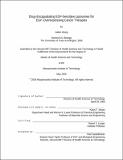Drug-encapsulating EGF-sensitive liposomes for EGF-overexpressing cancer therapies
Author(s)
Wong, Albert, S.M. Massachusetts Institute of Technology
DownloadFull printable version (1.810Mb)
Other Contributors
Harvard University--MIT Division of Health Sciences and Technology.
Advisor
Klavs F. Jensen and Robert S. Langer.
Terms of use
Metadata
Show full item recordAbstract
'Smart' targeted drug carriers have long been sought after in the treatment of epidermal growth factor (EGF)-overexpressing cancers due to the potential advantages, relative to current clinical therapies (generally limited to surgery, radiation therapy, traditional chemotherapy, and EGF receptor inhibitors (EGFRIs)), of using such 'smart' targeted drug delivery systems. However, progress toward this goal has been challenged by the difficulty of creating a drug carrier that can autonomously detect and respond to tumor cells in the body. 'Smart' micron-size drug-encapsulating epidermal growth factor (EGF)-sensitive liposomes for EGF-overexpressing cancer therapies have been developed and studied. These drug-encapsulating liposomes remain inert until they are exposed to an abnormal concentration of EGF. As a drug delivery system, these drug-encapsulating liposomes could release pharmaceutical agents specifically in the immediate neighborhood of tumors overexpressing EGF, thereby maximizing the effective amount of drug received by the tumor while minimizing the effective systemic toxicity of the drug. Additionally, quantitative mathematical models were developed to characterize multiple critical rate processes (including drug leakage from drug-encapsulating liposomes and distribution of (drug-encapsulating) liposomes in blood vessels) associated i with (drug-encapsulating) liposomes in general. (cont.) These quantitative mathematical models provide a low-cost and rapid method for screening novel drug-encapsulating liposome compositions, configurations, and synthetic methods to identify liposome compositions, configurations, and synthetic methods that would deliver optimal performance. The results provide a stepping stone toward the development of EGF-sensitive liposomes for clinical use. More generally, they also present implications for future development of other targeted drug delivery vehicles.
Description
Thesis (S.M.)--Harvard-MIT Division of Health Sciences and Technology, 2009. This electronic version was submitted by the student author. The certified thesis is available in the Institute Archives and Special Collections. Cataloged from PDF version of thesis. Includes bibliographical references (p. 68-72).
Date issued
2009Department
Harvard University--MIT Division of Health Sciences and TechnologyPublisher
Massachusetts Institute of Technology
Keywords
Harvard University--MIT Division of Health Sciences and Technology.